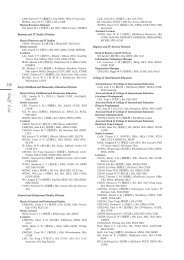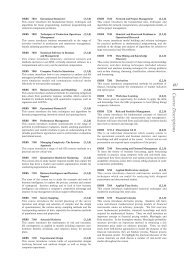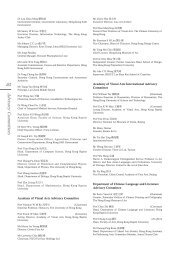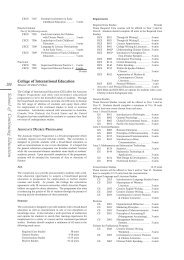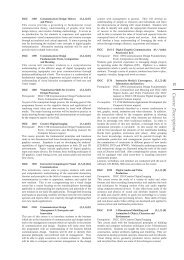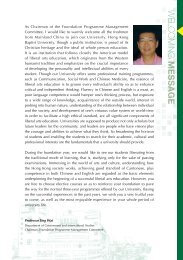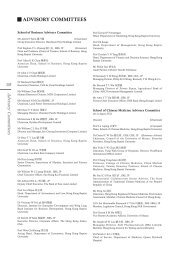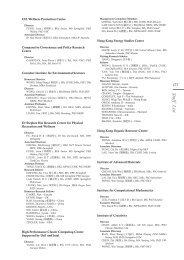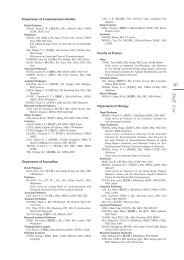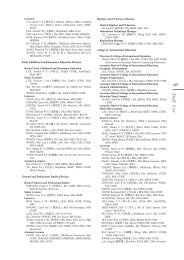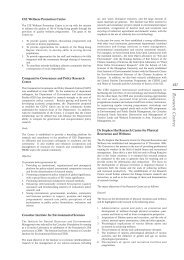310<strong>Course</strong> <strong>Descriptions</strong>working of the economy, the emphasis of the empirical techniquesallow students to estimate the economic models and enable themto make use insights for the most current economic studies into theeffect of government policy on the economy. With the building ofknowledge on both qualitative and quantitative macroeconomics,students are equipped with tools needed for understanding andconducting macroeconomic policy analysis.ECON 7140 Applied Econometric Analysis (3,3,0)This course aims at covering graduate level applied econometrictechniques to quantitatively solve empirical economic problems.In addition to the classical linear regression model, hypothesistesting and problems of non-spherical disturbances, moreadvanced topics are also considered. Students will be trainedto formulate econometric models and to identify the causalrelationships between economic variables using computersoftware. The emphasis is upon the interpretation and testing ofresults from different econometric estimation procedures. Studentswill also be provided with practical experience of applying thesetechniques to quantitatively solve empirical problems that arise ineconomics and business.ECON 7210 International Trade (3,3,0)This course aims to provide an up-to-date and understandableanalytical framework for illustrating current events of internationaltrade. Most of the time will be devoted to understand the classicalas well as modern theories of international trade, trade policyand international economic integration. Topics in internationaleconomics with an emphasis on current issues like globalization,financial crisis, regionalism, will then be studied.ECON 7220 International Finance (3,3,0)This course provides students with an understanding ofinternational finance concepts and applied techniques tointernational financial management and investment. This coursefocus on the foreign exchange markets and international capitalmarkets, and understand how international firms make financialdecisions of foreign investment, and measure foreign exchangerisk in the present global financial environment. The course isorganized in three parts: (1) introduction of international financialenvironment and the important international macroeconomicconcepts; (2) understanding the foreign exchange rate market,the exchange rate determinations with its theoretical analysis andforecasting, and the foreign exchange risk and its management;and (3) focus on international portfolio investment strategies andthe exchange risk management.ECON 7230 Monetary Economics (3,3,0)This course discusses the impacts of money demand and moneysupply, and therefore monetary policies on output, employment,and inflation. The role of central bank and its interaction withfirms and workers, more specifically, how it should carry outmonetary policies in face of the rational expectations of theseeconomic agents in the private sector, will be evaluated. Inaddition, under the rapid globalization, impacts of one country’smonetary policy on exchange rates and other country’s economieswill also be studied. After taking this course, students are expectedto be able to explain different phenomenon of the macro-economyand make forecasts about the basic macro-economic trends.ECON 7240 Economic Development and Growth (3,3,0)The aim of this course is to examine the driving forces andmechanisms of economic development and growth. We willexplain and discuss economic models and perspectives ondevelopment and growth, go through the empirical findings onthe issues and assess the difference and growth potentials acrosscountries.ECON 7250 Financial Economics (3,3,0)This course provides an introduction to financial economics. Thetopics include an introduction of capital markets, consumptionand investment, capital budgeting, the theory of choice, valuationof securities, portfolio analysis, bond analysis, options and futuresmarkets, International Financial Management, and EfficientCapital Markets. It will also provide students with knowledgeand skills in applications of modern finance theory to riskmanagement and other issues in economics and financial markets.Applications of the theory are emphasized throughout the course.ECON 7260 Economic Analysis of the Firm (3,3,0)This course introduces theories that explain the sizes, scopes,internal structures, and the kinds of contractual relations thatcharacterize business firms. Issues addressed include: why firmsexist, how firms are established, and what contributions firmsmake to the economy. The course provides innovative models ofeconomic equilibrium that endogenously determine the structureand function of economic institutions. The entrepreneur as adecision maker is analysed in details. In addition to the role ofa producer, the firm as an intermediary and as a market maker isalso discussed.ECON 7270 Topics in Microeconomics (3,3,0)This course aims at bringing current development ofmicroeconomics to students. The topics may vary from yearto year, depending on the research and teaching interest ofinstructors. Those topics are usually not covered or covered onlybriefly in ECON 7120. Some examples of topics are: theory ofincentives, theory of organizations, mechanism design, modellingmulti-person strategic behaviour, general equilibrium, modellingmulti-output production, etc. Three to five topics will be coveredthoroughly in one semester.ECON 7280 Topics in Macroeconomics (3,3,0)This course educates students in knowing the latest developmentof macroeconomics. The topics may vary from year to year,depending on the research and teaching interest of instructors.Some examples of topics are (1) how macroeconomic theoriescan be used to understand the complex relationships of a modernmarket economy, (2) why fluctuations and sometimes crisis mayoccur in an economy and (3) how government policies maybe used to stabilize the functioning of an economy. Currentmacroeconomics issues will be discussed, too, for example, thecauses and remedies of (l) the financial crisis of 2008, (2) the Eurocrisis and (3) the long-term stagnation in Japan.ECON 7310 Economic Institutions in China (3,3,0)This course studies key economic institutions of China that haveemerged in the course of transition from a planned to a marketeconomy. These institutions are not necessarily the first-bestchoices from the perspective of conventional theories of marketeconomy, but they might overcome some typical institutionalweaknesses of transitional economies. They include the doubletrackpricing and allocation system, local government ownershipof firms, fiscal decentralization and yardstick competition amongdifferent regional jurisdictions, etc. Drawing on the majorcontributions in the economics literature, the costs and benefits ofadopting these institutions by China will be analysed.ECON 7320 Public Finance and Monetary (3,3,0)Economics in ChinaThis course aims at providing an in-depth understanding of thefunctions and the performance of China’s fiscal, monetary andexchange rate systems, as well as their impact on the economy.After explaining major trends in those changing regimes, theirdevelopments in the post-1994 and post-2001 periods are analysed,using theoretical models and econometric techniques to tacklecritical issues.Regarding the fiscal system, the course emphasizes topics suchas central-local intergovernmental relations, the transition fromcontracts to tax assignment, and the impact of patterns oftaxation and public expenditure on macroeconomic developmentand income distribution, amongst others. Sterilization operationsfor a semi-open monetary regime and increasing flexibility of theexchange rate form the foci for discussion of the challenges facingthe People’s Bank of China, on top of the reforms of monetarytools and capital account liberalization.
The reactions and effectiveness of China’s fiscal-monetary mix inalleviating the adverse consequences of the global economic crisiswhich began to unfold from the fourth quarter of 2008 are to bereviewed. The course ends by an investigation of the evolvingfinancial relations between the Mainland and <strong>Hong</strong> <strong>Kong</strong>.ECON 7330 Foreign Economic Policies of China (3,3,0)This course discusses the foreign economic relations of Chinawith the rest of the world and the foreign economic policies ofChina. It explores how and why China integrates its economywith the world economy, major conflicts with other countries, andhow some of the conflicts were resolved or minimized. Topicscovered include China’s trade with other countries, accession tothe World Trade Organization, currency policy, and free tradeareas. Also covered are the relations between economic growthand foreign economic policies and the relations between domesticpolicies and foreign policies. Students can learn from this coursenot only how a developing country like China can benefit fromforeign trade but also the major conflicts China has with othercountries.ECON 7340 Productivity Analysis of the Chinese (3,3,0)EconomyThis course is an interdisciplinary field of economics, managementscience, mathematics and econometrics. It aims at applyingadvanced production theory and quantitative techniques forperformance gauging in multi-input, multi-output organizations.The productivity of individual enterprises as well as the wholeeconomy is the focus. Students will obtain hands-on experiencesuch as evaluating the efficiency losses of firms in variousindustries and the welfare losses of regional fragmentations. Theproductivity growth of the Chinese economy before and after theeconomic reform will also be studied.ECON 7410 Development and Policies of <strong>Hong</strong> (3,3,0)<strong>Kong</strong>’s Major Economic SectorsThe course aims at providing students with a theoretical andsystematic understanding of the latest development and publicpolicies of <strong>Hong</strong> <strong>Kong</strong>’s major economic sectors. These activitieswould include banking and finance, property and construction,industry, telecommunications, aviation and logistics, tourism,public utilities and the government sector. Policy reactionsunder the recent financial crisis and economic downturn will beanalysed. Their impacts on <strong>Hong</strong> <strong>Kong</strong>’s economic restructuringwill be examined. Focus would also be placed on <strong>Hong</strong> <strong>Kong</strong>’seconomic integration with the Pearl River Delta and relevantpolicy issues. Special emphasis will be given to the usage ofempirical analysis to evaluate the impact of economic policies.ECON 7420 Applied Time Series Analysis and (3,3,0)ForecastingThis course aims to introduce methods for time-series analysis,modelling and forecasting with computing application, andinterpretation. The major time series models such as time trend,cycle and seasonal modelling, smoothing, stationary and unitroots tests, causality analysis, distributed lag model, Box-JenkinsARIMA model, dummy dependent model, vector autoregression(VAR) and error correction (ER) model, ARCH and GARCHmodel, etc. The course shows how to apply these techniques toreal-life data and to develop forecasting models for economic,business and finance applications. Computing is an integral partof this course.ECON 7430 Applied Cost-Benefit Analysis (3,3,0)This course educates students in applied cost-benefit analysis of: (a)private investment, (b) public investment, (c) business strategy, and(d) government policy, with a primary focus of applying economicreasoning and writing/presentation skills to deliver practicalinformation for decision making in a complicated business world.ECON 7440 Applied Economics Research Paper (3,0,0)This course aims at training students to apply the knowledgeand skills developed in the taught courses of the programme toput together an original and analytical piece of research. It is acomplement of classroom learning and seeks to encourage criticalthinking and informed judgement. Each student of this coursemust write a research paper independently under the supervisionof a faculty member. The research paper would normallyentail the use of empirical methods such as data analysis oreconometrics.This course is offered in the summer term only and open tostudents with GPA not less than 3.5 in the first semester. Duringthe second semester, students who plan to take this course choosea research topic and produce a proposal. An academic supervisoris then allocated on the basis of each chosen topic.ECON 7450 Energy Economics (3,3,0)This course educates students in (a) interactions among energy,economy, and environment; (b) energy market organization,regulation and deregulation; (c) energy demand, pricing,investment, supply and costs; (d) energy efficiency, conservationand demand management; and (e) risk management, energysecurity, emissions control, and renewable energy development.ECON 7510 China’s Economic Development and (3,3,0)ReformThis course provides an overview of the Chinese economy, withemphasis on the development in the reform period. It mainlycovers the post-1978 evolution of reform measures in varioussectors, including agriculture, industry, financial institutions, fiscalsystem and foreign sectors. The growth and equity implicationsof the reforms will also be evaluated.ECON 7520 China’s Foreign Trade and Investment (3,3,0)This course aims to introduce student basic facts and analysis ofthe rationale, the institutional changes, arrangements and policiesas well as the economic impacts of foreign trade and investmentliberalization in post-1978 China. The first part provides atheoretical as well as empirical framework for analysis of China’sforeign trade issues. The second part examines and assessesthe recent developments of foreign investment in China. Uponcompletion of the course, students are expected to have basicunderstanding of how foreign investment and trade have beenconducted in China; how they may have shaped the structure,administration and performance of the Chinese economyparticularly in the post-1978 reform period and how could theirbeneficial role be strengthened.ECON 7540 Graduate Workshops on China’s (3,3,0)EconomyThis course discusses some fundamental issues that are useful foranalysing the problems facing the Chinese economy today. Inparticular, we will discuss three important questions. First, whatare the major economic factors that determinate the economicgrowth of a developing country? Second, how governments canstabilize their countries’ economic growth pattern? Finally, howcan we identify the stimulating effect of economic policies ongrowth?ECON 7710 Advanced Econometrics (3,3,0)The goal of the course is to provide students with advancedtheories in econometrics. The emphasis is on theoreticalunderpinnings and unifying themes, to be supplemented byapplied computer work. Students completed this course should beable to conduct sophisticated empirical research.ECON 7720 Advanced Microeconomics (3,3,0)This course educates students advanced treatments ofmicroeconomics by emphasizing more rigorous proofs. Studentswill investigate the optimization behaviour of individual agentsas well as resource allocation in a decentralized economy.Uncertainty and strategic behaviours will be introduced in thiscourse, too.311<strong>Course</strong> <strong>Descriptions</strong>
- Page 3 and 4: economic growth, trade, pollution,
- Page 5 and 6: specific empirical economic problem
- Page 7 and 8: of private enterprises in the indus
- Page 9: period. The first part of the cours
- Page 14: 314Course DescriptionsEDUC 3080 Tea
- Page 17 and 18: development of children and adolesc
- Page 19 and 20: and communication skills in differe
- Page 21 and 22: y ubiquitous technology. Learners w
- Page 23 and 24: ENG 2650 Topics in English Grammar
- Page 25 and 26: clause structures of the English la
- Page 27 and 28: adopted for reading and interpretin
- Page 29 and 30: drama; and (2) introduce Western dr
- Page 31 and 32: ENGL 4005 Advanced Topic in Compara
- Page 33 and 34: attendant to the break-up of mediev
- Page 35 and 36: EURO 3205 Comparative Politics of (
- Page 37 and 38: states, enlargement provides signif
- Page 39 and 40: to create and develop ideas via rel
- Page 41 and 42: strategies of awarded campaigns to
- Page 43 and 44: characteristics of films, film-make
- Page 46: 346Course DescriptionsFINE 1005 Fin
- Page 49 and 50: GCHC 1005 China and the Global Econ
- Page 51 and 52: the period with a special focus on
- Page 53 and 54: est decision-making procedures. Mor
- Page 55 and 56: GCPE 1065 Table Tennis (1,2,0) (C)T
- Page 57 and 58: and/or philosophical traditions the
- Page 59 and 60: on the use of English in various se
- Page 61 and 62:
GDAR 1835 Music, Mind, and Human (3
- Page 63 and 64:
lead to successful development of n
- Page 65 and 66:
management and proactive stakeholde
- Page 67 and 68:
GDCV 1065 Buildings of Hong Kong: (
- Page 69 and 70:
of various religions that broaden t
- Page 71 and 72:
their implications for contemporary
- Page 73 and 74:
gone through since 1945 included th
- Page 75 and 76:
GEOG 1005 Geography and the Contemp
- Page 77 and 78:
students to the concepts and techni
- Page 79 and 80:
GEOG 3730 Energy Policy and Analysi
- Page 81 and 82:
processes interact with China’s s
- Page 83 and 84:
GERM 1006 German II (3,3,0) (G)Prer



